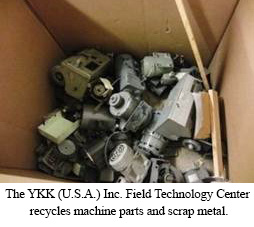Long before it became cool for companies to promote their sustainable manufacturing practices, in 1994 YKK’s former chairman and CEO, Tadahiro Yoshida, established the YKK Group Environmental Pledge. It states that, “The YKK Group proclaims that it will address and promote ‘harmony with the environment’ as the highest priority of its business activities.”
 In addition to our environmental pledge, in 2009, YKK established an Environmental Compliance Committee within our North and Central America region to bring together managers to discuss environmental regulatory requirements and to discuss best practices. The committee is made up of environmental managers from each of our manufacturing locations in the U.S., Canada and Latin America. It meets quarterly and continuously looks for ways to ensure that employees at our different sites are aware of applicable environmental regulatory requirements in order for them to remain in compliance and so that we can protect the environment.
In addition to our environmental pledge, in 2009, YKK established an Environmental Compliance Committee within our North and Central America region to bring together managers to discuss environmental regulatory requirements and to discuss best practices. The committee is made up of environmental managers from each of our manufacturing locations in the U.S., Canada and Latin America. It meets quarterly and continuously looks for ways to ensure that employees at our different sites are aware of applicable environmental regulatory requirements in order for them to remain in compliance and so that we can protect the environment.
Each of our companies within the North and Central America region have programs in place within their facilities to help ensure that they are following applicable environmental laws. Many of these programs include recycling as well as the elimination of hazardous wastes and other sustainable manufacturing practices.
Today we begin a series of articles which explains what each of our companies and facilities are doing to protect our environment so that we may transfer it to future generations in sound condition.
The YKK (U.S.A.) Inc. Field Technology Center (FTC) in Marietta, Georgia is a great example of one of our locations that takes our environmental pledge to heart. It recycles its machines, scrap metal, spare parts, and paper and cardboard. It also continues to replace outdated florescent lighting with more energy efficient lighting. By having its machinery repainted outside of its facility rather than inside, the FTC has also eliminated waste solvents and paints from this process. The FTC also tracks its water and power consumption and separates waste water from irrigation water. In addition, it also continually promotes energy saving and recycling programs among its employees.
